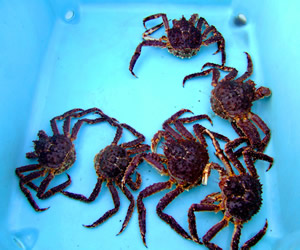UAF researchers begin second year of king crab hatchery studies
UAF researchers begin second year of king crab hatchery studies
Submitted by Doug Schneider
Phone: 907-474-7449
12/07/07
Kodiak, Alaska--Fishermen last month harvested boatloads of giant red king crab from Bristol Bay, where stocks of the tasty crustacean have been increasing. Eighteen crabs harvested by fishermen aboard the FV Stormbird will end up not on the dinner table, but in research labs in Kodiak and Seward.
The crabs, all females, each bearing hundreds of thousands of eggs in clutches beneath a hard flap on their underside, will participate in the second year of a UAF-led research effort aimed at understanding the scientific and technical complexities of hatching and raising large numbers of red king crab in a hatchery. The knowledge scientists gain will help policymakers decide whether to use hatcheries to rebuild red king crab in waters elsewhere in the state, where natural events have not succeeded in rebuilding king crab populations. Key among those places are the waters around Kodiak Island, once the scene of the state’s largest red king crab harvests. Fishermen there have not had a commercial red king crab harvest in the last 25 years.
"Six crabs were shipped alive from Bristol Bay to the NOAA Kodiak Laboratory, and 12 crabs were delivered to UAF’s marine research lab in Seward," said Ginny Eckert, UAF associate professor and lead scientist. "Over the coming months we and our partners in Kodiak and the Alutiiq Pride Shellfish Hatchery in Seward will learn more about how to keep adults alive and healthy as they progress toward hatching their eggs in the spring. Once the eggs hatch, we’ll study the diet and environmental needs of crab growing from larval up through to the juvenile stages."
The efforts are part of a unique federal, state, university, coastal community, Alaska Native, and fishing industry partnership called the Alaska King Crab Research, Rehabilitation and Biology (AKCRRAB) program. The program is led by the NOAA Alaska Sea Grant College Program headquartered at UAF.
"It’s a big group of diverse people from Kodiak to the Pribilof Islands concerned about the fate of our red and blue king crab fisheries," said Jeff Stephan, manager of the Kodiak-based United Fishermen’s Marketing Association and member of the AKCRRAB steering committee. "We all have banded together to see what we can do to help the fisheries recover, and that means first obtaining the biological knowledge we need about these species."
For a time during the 1960s, Kodiak Island waters teemed with red king crab. Kodiak itself became the center of the state’s crab fishing bonanza. At its peak in 1965, fishermen harvested more than 94 million pounds of crab worth about $12 million. Fortunes were made, but the boom soon went bust. By the early 1980s, Kodiak red king crab stocks had collapsed and the fishery all but disappeared. Decades of fishing restrictions since have failed to rebuild these populations. Brian Allee, director of the Alaska Sea Grant College Program, said the time is right to try something new.
"These are the first steps toward what will be a sustained research effort to gain the body of knowledge we need to make wise choices about how to rebuild these fisheries," said Allee.
AKCRRAB scientists launched their research efforts in 2006 with the successful collection of 16 egg-bearing adults and subsequent hatch of millions of red and blue king crab larvae. Researchers also plan to continue efforts to understand the hatchery needs of blue king crab. In March 2008, scientists with the help of subsistence fishermen from the Norton Sound region plan to collect crabs for similar studies aimed at one day rebuilding collapsed blue king crab stocks around the Pribilof Islands in the central Bering Sea.
Alaska Sea Grant’s Allee said several years of laboratory and field studies are needed before the king crab research program can seek state approval to conduct a pilot release of juvenile crab into Alaska waters.
Alaska King Crab Research, Rehabilitation and Biology (AKCRRAB) Program
Contacts:
Jeff Stephan, AKCRRAB steering committee and manager, United Fishermen’s Marketing Association,
cell: 907-350-2088,
jstephan@ptialaska.net
Ginny Eckert, AKCRRAB science team leader and associate professor, University of Alaska Fairbanks and UA Southeast, 907-796-6450, ginny.eckert@uas.alaska.edu
Brian Allee, director, Alaska Sea Grant College Program, University of Alaska Fairbanks, 907-474-7949, allee@sfos.uaf.edu



